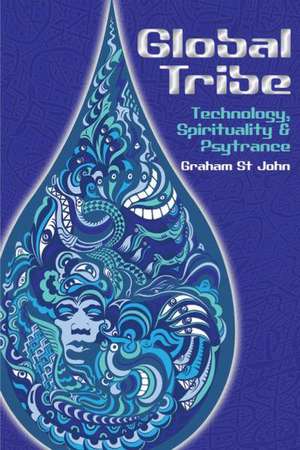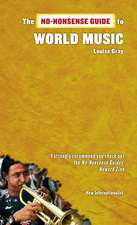Global Tribe: Technology, Spirituality and Psytrance: Studies in Popular Music
Autor Graham St Johnen Limba Engleză Paperback – 30 iun 2012
Preț: 234.98 lei
Nou
Puncte Express: 352
Preț estimativ în valută:
44.96€ • 46.95$ • 37.13£
44.96€ • 46.95$ • 37.13£
Carte tipărită la comandă
Livrare economică 15-29 aprilie
Preluare comenzi: 021 569.72.76
Specificații
ISBN-13: 9781845539566
ISBN-10: 1845539567
Pagini: 224
Ilustrații: 42 illustrations
Dimensiuni: 155 x 231 x 25 mm
Greutate: 0.59 kg
Ediția:New.
Editura: Equinox Publishing (Indonesia)
Seria Studies in Popular Music
ISBN-10: 1845539567
Pagini: 224
Ilustrații: 42 illustrations
Dimensiuni: 155 x 231 x 25 mm
Greutate: 0.59 kg
Ediția:New.
Editura: Equinox Publishing (Indonesia)
Seria Studies in Popular Music
Notă biografică
Cuprins
Ch 1. Transnational Psytrance Ch 2. Goa Beach: Experience and the Orient Ch 3. The Vibe at the End of the World Ch 4. Spiritual Technology: Transition and its Prosthetics Ch 5. Psychedelic Festivals, Visionary Arts and Cosmic Events Ch 6. Freak Out: The Trance Carnival Ch 7. Psyculture in Israel and Australia Ch 8. Performing Risk and the Arts of Consciousness Ch 9. Riot of Passage: Liminal Culture and the Logics of Sacrifice Ch 10. Nothing Lasts Bibliography Filmography Discography
Recenzii
'From the esoteric traveler jams of Goa to the liminal zones of Boom and Burning Man, Graham St John guides us through the cosmic carnival of global psytrance with an intoxicating blend of deep research, empathic ethnography, and edge-dancing cultural analysis. This is the definitive book on what has become, from the perspective of planetary spiritual culture, the most resonant music scene of our transhuman century.' Erik Davis, author of The Visionary State and Nomad Codes: Adventures in Modern Esoterica 'Graham St John writes more insightfully about psytrance than any other academic. He provides a sophisticated understanding of that subtle relationship between contemporary spirituality, dance and music. The festival and the party are also a window into broader cultural trends. He understands both the intensity and transformative experience of psytrance, and draws on, and develops, contemporary academic theory to interpret psytrance in a way that is both respectful and incisive. We need more work like this.' Douglas Ezzy, Associate Professor, Sociology, University of Tasmania

























